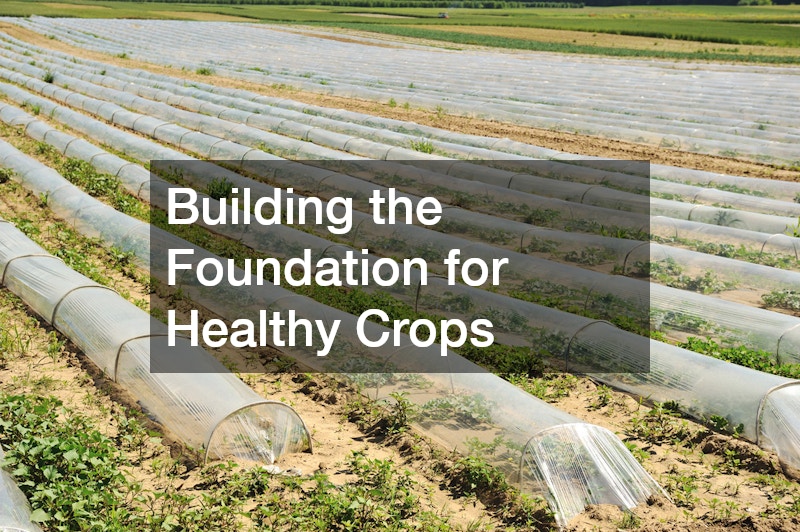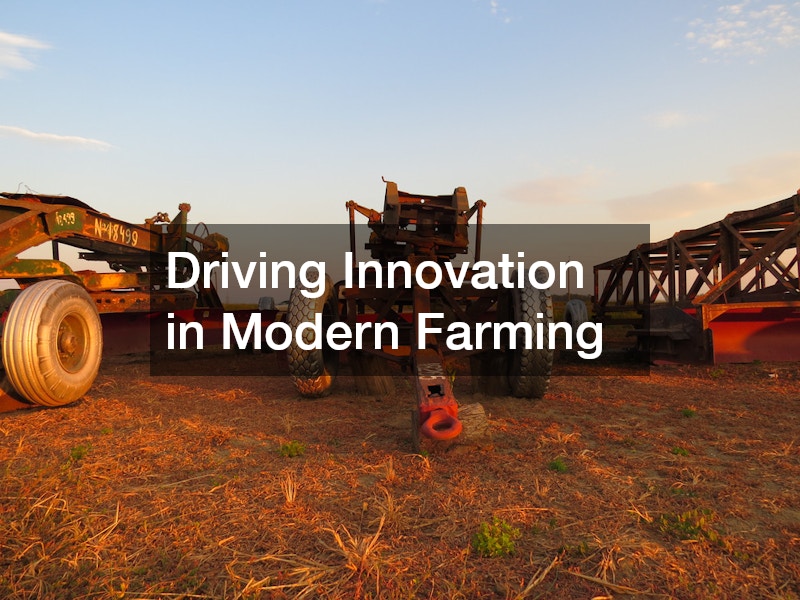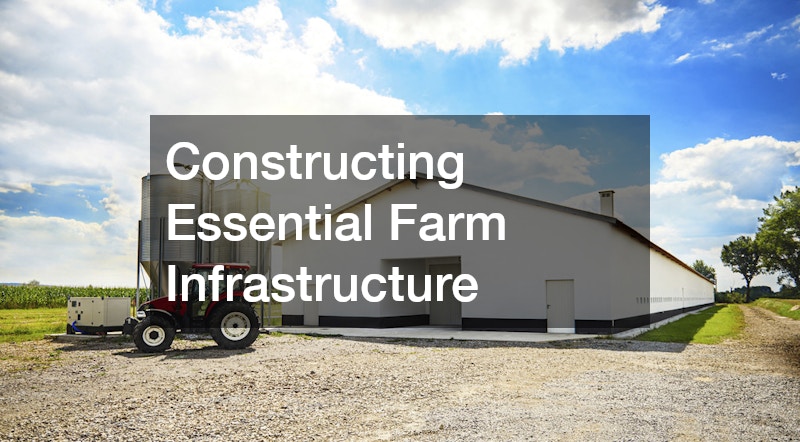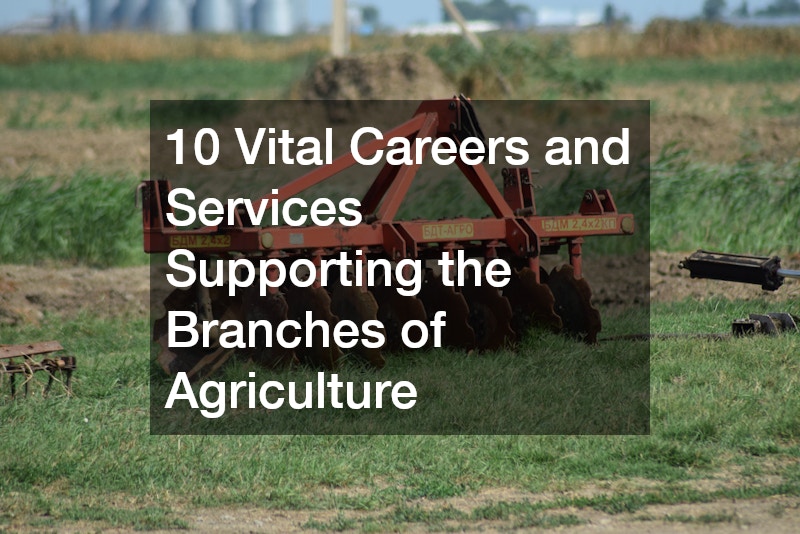
Agriculture remains one of the most fundamental industries in human civilization, not only feeding the global population but also sustaining economies and cultures around the world. With innovation and technology continuing to evolve the sector, the term ‘branches of agriculture’ encapsulates an increasingly complex array of sub-industries and specialized services. From top soil suppliers to agricultural propane services, every element plays a crucial role in powering the agricultural machine. As the demand for food and sustainable practices rises, so does the necessity for improving these branches, making them more efficient and supportive of modern farming needs.
Each branch or sub-sector contributes a unique facet to agriculture’s overall health and efficiency by offering highly specialized skills and products. For example, lecithin manufacturers can improve food processing, whereas excavation companies prepare the physical land essential for crop cultivation. Furthermore, services such as well drilling and maintenance ensure reliable water sources, underpinning the agricultural matrix. In the coming sections, we delve deeper into how each of these diverse branches integrates into the wider agricultural ecosystem, strengthening its foundation and paving the way for innovation and sustainability.
1. Building the Foundation for Healthy Crops

The success of any agricultural venture begins with the soil, which is why the role of a top soil supplier is quintessential. These suppliers provide the essential groundwork that ensures robust crop yields and healthy plant growth. High-quality topsoil contains the necessary nutrients, pH balance, and microbial activity to foster plant health, making it a cornerstone in the branches of agriculture.
Topsoil suppliers work closely with agricultural experts to tailor their products for specific crop needs. By testing soil samples, they can recommend the ideal type and amount of soil needed to maximize the yield. In addition, the focus on sustainable practices such as erosion control and soil conservation methods is crucial, aligning with broader agricultural objectives to protect natural resources.
In the branches of agriculture, soil health is non-negotiable, forming the building blocks of the entire agricultural cycle. Decisions made at this foundational stage significantly impact not just the yield but also the long-term sustainability of farming operations. The integration of improved soil management practices facilitates better crop rotation and reduces environmental impact.
2. Powering Farm Operations Efficiently
Efficiency is a staple requirement across all branches of agriculture, and it is particularly evident in the utility sector with services like agricultural propane service. This form of energy supply is favored for its cost-effectiveness, reliability, and brief environmental footprint when compared to other fossil fuels. Propane’s versatility in applications, from heating barns to fueling irrigation pumps, makes it indispensable.
Agricultural propane services are not only responsible for the steady supply of energy but also for ensuring its safe usage. Through industry standards and safety training, they help farm operators to harness propane optimally. It reduces overall operational costs while providing a reliable power source, crucial for uninterrupted farm activities.
Adopting propane as a cleaner energy alternative aligns well with the growing push towards sustainable practices within the branches of agriculture. As the industry increasingly seeks to balance productivity with ecological considerations, services like these provide pivotal solutions, enhancing operational efficiency without causing environmental harm.
Beyond its role in daily operations, propane also supports innovation in modern farming by powering advanced equipment and technologies that improve efficiency. From grain-drying systems to greenhouse heating, its applications extend across diverse agricultural needs, reinforcing its value as a dependable energy source. By enabling farms to operate smoothly year-round, agricultural propane services help strengthen the resilience of food production systems and contribute to the overall stability of agricultural communities.
3. Bridging Agriculture and Food Processing
As crops transition from the farm to food products, the role of a lecithin manufacturer stands out significantly within the branches of agriculture. Lecithin, a naturally occurring emulsifier found in soybeans, sunflower seeds, and egg yolks, is a critical component in food processing due to its stabilizing properties. It enhances texture and extends shelf life, making it an essential additive in diverse food items.
Lecithin manufacturers work at the nexus between agriculture and food processing, ensuring a seamless integration of ingredients into consumer products. Beyond food, lecithin’s applications extend to pharmaceuticals and cosmetics, underscoring its wide-reaching influence. Moreover, lecithin manufacturers often collaborate with farmers to ensure a steady supply of raw materials, endorsing sustainable farming practices.
The branches of agriculture benefit from having such interconnected roles that bolster the entire food supply chain. As consumer demands evolve toward healthier, more natural ingredients, lecithin’s status as a naturally derived emulsifier only gains importance, presenting opportunities for innovation in organic processing and clean-label foods.
4. Driving Innovation in Modern Farming

No discussion around the branches of agriculture would be complete without considering the significant role of a farm equipment company. These companies are at the forefront of agricultural innovation, crafting high-tech machinery and tools that transform traditional farming methodologies. Technologies developed here range from GPS-guided tractors to drones used for crop monitoring.
Innovation in farm equipment leads to improved efficiency, productivity, and profitability, meeting the challenges of feeding a growing global population. Advanced machinery can reduce labor costs, enhance precision in planting and harvesting, and minimize waste. The alignment of these innovations with sustainable practices exemplifies how technology bolsters modern agricultural strategies.
Farm equipment companies are integral to the branches of agriculture as they design products that adapt to changing climates and soil conditions. By prioritizing sustainability, these companies help ensure that technological advancements contribute positively to environmental stewardship, making agriculture more resilient and less resource-intensive.
5. Supporting Horticulture and Forestry Branches
Horticulture and forestry are two fundamental branches of agriculture that require specialized care and management. Tree care companies, focusing primarily on the upkeep and health of various tree species, play a crucial role here. They offer services ranging from pest control and fertilization to pruning and removal, ensuring the longevity and productivity of orchards and forested areas.
Effective tree care services not only enhance aesthetic and ecological value but also bolster economic returns for small-scale and industrial tree farmers. Tree health impacts biodiversity and plays a role in larger environmental cycles such as carbon sequestration. The health of the trees directly affects yields and, therefore, the overall supply chain, making these services invaluable.
In the branches of agriculture, adequate support to horticulture and forestry practices ensures that these vital areas continue to thrive and contribute to national and global economies. The integration of scientific techniques and traditional knowledge brings about balanced ecosystem management, aiding in the restoration and maintenance of environmentally significant sites.
6. Preparing Land for Agricultural Growth
Preparation of land for farming begins with the essential role of excavation companies. By specializing in land clearing, grading, and soil testing, they lay the groundwork for agricultural productivity. Properly prepared land supports robust crop growth and provides the structural base for further agricultural infrastructure.
Excavation companies employ advanced machinery to perform tasks efficiently and sustainably. Their focus on proper land management helps minimize erosion and maintain nutrient-rich topsoil, which are crucial considerations in agriculture. This groundwork is vital for any subsequent agricultural activity, acting as an enabler for higher crop yields.
In an era where sustainable farming is paramount, these companies increasingly use eco-friendly techniques such as controlled tillage and land restoration projects. Such measures ensure that the agricultural land is not only productive but also resilient to climate change factors, reinforcing the overall sustainability goals within agriculture.
7. Constructing Essential Farm Infrastructure

Creating functional and durable farm infrastructure is crucial, and this is where a pole barn contractor comes into play. Pole barns, known for their cost-effectiveness and versatility, serve as essential structures for storage, livestock housing, and equipment protection. These contractors specialize in constructing tailor-made solutions that meet individual farm needs.
With climate challenges posing threats to food security, the design and durability of agricultural infrastructure gain unprecedented importance. Pole barn contractors work closely with farmers to construct buildings that withstand weather extremes, secure equipment, and enhance operational efficiency, making them pivotal to the branches of agriculture.
Investing in resilient infrastructure means that farm operations can continue with minimal interruptions, safeguarding crops and livestock. The collaboration between pole barn contractors and other agricultural stakeholders embodies how integrated efforts ensure that the foundational elements of agriculture are strong and sustainable, supporting a thriving agricultural sector.
8. Keeping Agricultural Machinery on the Move
The logistics and mobility of farm equipment are fundamental to maintaining smooth agricultural operations. This is where heavy equipment hauler expertise becomes critical. These professionals ensure the safe transportation of large machinery, from tractors to combines, minimizing downtime and loss of productivity.
By providing secure, reliable transport, heavy equipment haulers enable farms to operate at peak efficiency, particularly during planting and harvesting seasons. They represent an essential logistical support system within the branches of agriculture, adapting to varied terrains and weather conditions to meet farmers’ needs.
The transportation of machinery is not only a logistical feat but also contributes to overall farm sustainability. Efficient transit reduces fuel consumption and emissions, aligning well with agricultural sustainability goals. This synergy is crucial in reducing agriculture’s environmental footprint while maintaining high production levels.
9. Enhancing Versatility in Farm Work
Versatility and efficiency in farm work are significantly boosted by the use of specialized equipment like skid steer attachments. These versatile tools permit a wide range of tasks from soil preparation to livestock management. In the branches of agriculture, having multi-functional equipment can greatly enhance operational efficiency.
Skid steer attachments allow small to medium-sized farms to optimize their labor usage, reduce manual labor, and increase productivity. By offering flexibility and adaptability, these attachments help cater to diverse farm tasks without requiring multiple specialized machines, fostering cost-effectiveness.
As the agriculture industry advances, there’s a continuous innovation drive in designing attachments that meet evolving farm demands. The integration of these tools into farm operations emphasizes adaptability, meeting the dynamic needs of modern agriculture and allowing for a more streamlined workflow that supports sustainable practices.
In addition to improving efficiency, skid steer attachments contribute to greater resilience across different agricultural branches by enabling farmers to quickly adjust to seasonal needs and unexpected challenges. Whether it’s clearing debris after storms, managing feed supplies, or preparing land for new crops, these attachments empower farmers with practical solutions that save time and resources. This adaptability not only strengthens day-to-day operations but also supports long-term sustainability and farm profitability.
10. Ensuring Reliable Water for Agriculture

Water is a lifeline for agriculture, and well services play a vital role in ensuring this resource is available and managed effectively. Well drilling, maintenance, and water management are critical in regions facing water scarcity, directly affecting the productivity and sustainability across the branches of agriculture.
By delivering reliable access to water, well services enhance farm productivity, allowing for improved irrigation practices that safeguard crop health. Proactive water management reduces waste and ensures efficient use of resources, aligning with broader objectives of sustainability and resource stewardship.
The role of well services extends to implementing water-saving technologies and advising on best practices, fostering resilient agricultural systems. As global water resources face increasing pressures, these services become indispensable, highlighting the importance of integrating comprehensive water management solutions into agricultural operations.
Beyond supporting crop irrigation, reliable well services also benefit livestock operations and aquaculture by maintaining consistent water quality and availability. Clean and dependable water supplies are essential not only for animal health but also for food safety and overall farm efficiency. By ensuring that every agricultural branch has access to this critical resource, well services help secure long-term stability for farming communities and the broader food supply chain.
The modern landscape of agriculture is a complex network of interdependent sectors and services, each playing an essential role in the industry’s health and sustainability. From soil management to energy supply, from processing to infrastructure, agriculture encompasses a wide array of specialized areas that collectively empower the sector. Through the contributions of diverse service providers such as topsoil suppliers and agricultural propane services, farms optimize their operations, improving both productivity and sustainability.
Innovation remains at the core of modern agriculture, with each branch striving to meet the demands of a growing population while adhering to sustainable practices. Services like lecithin manufacture and well management highlight the intricate link between natural resources and their processed end-products. Meanwhile, farm equipment companies and heavy equipment haulers demonstrate the vital role technology plays in advancing agricultural productivity and efficiency.
In summary, the agricultural industry thrives through collaboration across its branches, weaving together traditional methods and cutting-edge innovations to secure food supply and environmental stewardship. As challenges evolve, the adaptability and resilience of these sectors ensure that agriculture continues to serve as a pillar of human civilization.




